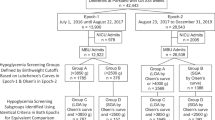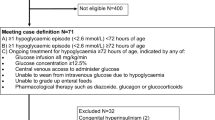Abstract
Objectives
To determine the proportion of well-appearing newborns screened for hypoglycemia, yield of specific screening criteria, and impact of screening on breastfeeding.
Study design
The retrospective study of well-appearing at-risk infants born ≥36 weeks’ gestation with blood glucose (BG) measurements obtained ≤72 h of age.
Results
Of 10,533 eligible well newborns, 48.7% were screened for hypoglycemia. Among tested infants, BG < 50 mg/dL occurred in 43% and 4.6% required intensive care for hypoglycemia. BG < 50 mg/dL was associated with lower rates of exclusive breastfeeding (22% vs 65%, p < 0.001). Infants screened due to late-preterm birth were most frequently identified as hypoglycemic. The fewest abnormal values occurred among appropriate weight, late-term infants of nondiabetic mothers.
Conclusion
Hypoglycemia risk criteria result in screening a large proportion of otherwise well newborns and negatively impact rates of exclusive breastfeeding. The risks and benefits of hypoglycemia screening recommendations should be urgently addressed.
This is a preview of subscription content, access via your institution
Access options
Subscribe to this journal
Receive 12 print issues and online access
$259.00 per year
only $21.58 per issue
Buy this article
- Purchase on Springer Link
- Instant access to full article PDF
Prices may be subject to local taxes which are calculated during checkout
Similar content being viewed by others
References
Committee on Fetus and Newborn, Adamkin DH. Postnatal glucose homeostasis in late-preterm and term infants. Pediatrics. 2011;127:575–9.
McKinlay CJ, Alsweiler JM, Ansell JM, Anstice NS, Chase JG, Gamble GD, et al. Neonatal glycemia and neurodevelopmental outcomes at 2 years. N Engl J Med. 2015;373:1507–18.
Thornton PS, Stanley CA, De Leon DD, Harris D, Haymond MW, Hussain K, et al. Recommendations from the pediatric endocrine society for evaluation and management of persistent hypoglycemia in neonates, infants, and children. J Pediatr. 2015;167:238–45.
Wight N, Marinelli KA. Academy of breastfeeding medicine. ABM clinical protocol# 1: guidelines for blood glucose monitoring and treatment of hypoglycemia in term and late-preterm neonates, revised 2014. Breastfeed Med. 2014;9:173–9.
Andermann A, Blancquaert I, Beauchamp S, Déry V. Revisiting Wilson and Jungner in the genomic age: a review of screening criteria over the past 40 years. Bull World Health Organ. 2008;86:317–9.
Adamkin DH, Polin RA. Imperfect advice: neonatal hypoglycemia. J Pediatr. 2016;176:195–6.
Adamkin DH. Neonatal hypoglycemia. Curr Opin Pediatr. 2016;28:150–5.
Thornton PS. Neonates at risk for hypoglycemia: associated neurological outcomes. J Pediatr. 2016;170:343–4.
Bateman BT, Patorno E, Desai RJ, Seely EW, Mogun H, Maeda A, et al. Late pregnancy beta blocker exposure and risks of neonatal hypoglycemia and bradycardia. Pediatrics. 2016;138. https://doi.org/10.1542/peds.2016-0731.
Dhudasia MB, Mukhopadhyay S, Wade KC, Puopolo KM. Impact of neonatal hypoglycemia screening in the well baby nursery and trends in neonatal intensive care unit admissions. Pediatrics. 2018;142. https://doi.org/10.1542/peds.142.1_MeetingAbstract.554.
Zhao D, Zou L, Lei X, Zhang Y. Gender differences in infant mortality and neonatal morbidity in mixed-gender twins. Sci Rep. 2017;7:8736.
Fenton TR, Kim JH. A systematic review and meta-analysis to revise the Fenton growth chart for preterm infants. BMC Pediatr. 2013;13:59.
Lubchenco LO, Bard H. Incidence of hypoglycemia in newborn infants classified by birth weight and gestational age. Pediatrics. 1971;47:831–8.
Harris DL, Weston PJ, Harding JE. Incidence of neonatal hypoglycemia in babies identified as at risk. J Pediatr. 2012;161:787–91.
Chantry CJ, Dewey KG, Peerson JM, Wagner EA, Nommsen-Rivers LA. In-hospital formula use increases early breastfeeding cessation among first-time mothers intending to exclusively breastfeed. J Pediatr. 2014;164:1339–45.e5.
Ip S, Chung M, Raman G, Chew P, Magula N, DeVine D, et al. Breastfeeding and maternal and infant health outcomes in developed countries. Evid Rep Technol Assess (Full-Rep). 2007;153:1–186.
Gagnon AJ, Leduc G, Waghorn K, Yang H, Platt RW. In-hospital formula supplementation of healthy breastfeeding newborns. J Hum Lact. 2005;21:397–405.
Temple Newhook J, Newhook LA, Midodzi WK, Murphy Goodridge J, Burrage L, Gill N, et al. Determinants of nonmedically indicated in-hospital supplementation of infants whose birthing parents intended to exclusively breastfeed. J Hum Lact. 2017;33:278–84.
Kair LR, Flaherman VJ. Donor milk or formula: a qualitative study of postpartum mothers of healthy newborns. J Hum Lact. 2017;33:710–6.
Ferrarello D, Froh EB, Hinson TD, Spatz DL. Nurses’ views on using pasteurized donor human milk for hypoglycemic term infants. MCN Am J Matern Child Nurs. 2019;44:157–63.
Wojcicki JM. Maternal prepregnancy body mass index and initiation and duration of breastfeeding: a review of the literature. J Women’s Health. 2011;20:341–7.
Harris DL, Weston PJ, Signal M, Chase JG, Harding JE. Dextrose gel for neonatal hypoglycaemia (the sugar babies study): a randomised, double-blind, placebo-controlled trial. Lancet. 2013;382:2077–83.
Sen S, Benjamin C, Riley J, Heleba A, Drouin K, Gregory K, et al. Donor milk utilization for healthy infants: experience at a single academic center. Breastfeed Med. 2018;13:28–33.
Solimano A, Kwan E, Osiovich H, Dyer R, Elango R. Dextrose gels for neonatal transitional hypoglycemia: what are we giving our babies? Paediatr Child Health. 2019;24:115–8.
McKinlay CJD, Alsweiler JM, Anstice NS, Burakevych N, Chakraborty A, Chase JG, et al. Association of neonatal glycemia with neurodevelopmental outcomes at 4.5 years. JAMA Pediatr. 2017;171:972–83.
Lucas A, Morley R, Cole TJ. Adverse neurodevelopmental outcome of moderate neonatal hypoglycaemia. BMJ. 1988;297:1304–8.
Tin W, Brunskill G, Kelly T, Fritz S. 15-year follow-up of recurrent “hypoglycemia” in preterm infants. Pediatrics. 2012;130:e1497–503.
Ho HT, Yeung WK, Young BW. Evaluation of “point of care” devices in the measurement of low blood glucose in neonatal practice. Arch Dis Child Fetal Neonatal Ed. 2004;89:F356–9.
Traill Z, Squier M, Anslow P. Brain imaging in neonatal hypoglycaemia. Arch Dis Child Fetal Neonatal Ed. 1998;79:F145–7.
Kaiser JR, Bai S, Gibson N, Holland G, Lin TM, Swearingen CJ, et al. Association between transient newborn hypoglycemia and fourth-grade achievement test proficiency: a population-based study. JAMA Pediatr. 2015;169:913–21.
Cornblath M, Hawdon JM, Williams AF, Aynsley-Green A, Ward-Platt MP, Schwartz R, et al. Controversies regarding definition of neonatal hypoglycemia: suggested operational thresholds. Pediatrics. 2000;105:1141–5.
Funding
This study was partly supported by Eunice Kennedy Shriver National Institute of Child Health and Human Development Grant (Number—1K23HD088753-01A1).
Author information
Authors and Affiliations
Contributions
SM contributed to study design and analysis, drafted the initial paper, and reviewed and revised the paper. KCW designed the study, contributed to data cleaning, analysis and validation, and reviewed and revised the paper. MBD collected and analyzed the data, and reviewed and revised the paper. LS collected and validated the data, and reviewed and revised the paper. DD and JHC contributed to the study design, provided expertise with analyzing data, and reviewed and revised the paper. KMP conceptualized the study, contributed to study design, and reviewed and revised the paper. All authors approved the final paper as submitted and agree to be accountable for all aspects of the work.
Corresponding author
Ethics declarations
Conflict of interest
The authors declare that they have no conflict of interest. This article to disclose.
Additional information
Publisher’s note Springer Nature remains neutral with regard to jurisdictional claims in published maps and institutional affiliations.
Rights and permissions
About this article
Cite this article
Mukhopadhyay, S., Wade, K.C., Dhudasia, M.B. et al. Clinical impact of neonatal hypoglycemia screening in the well-baby care. J Perinatol 40, 1331–1338 (2020). https://doi.org/10.1038/s41372-020-0641-1
Received:
Revised:
Accepted:
Published:
Issue Date:
DOI: https://doi.org/10.1038/s41372-020-0641-1
This article is cited by
-
Sudden neonatal death in individuals with medium-chain acyl-coenzyme A dehydrogenase deficiency: limit of newborn screening
European Journal of Pediatrics (2022)
-
Does a lower interventional glucose threshold affect neurodevelopment in at-risk neonates?
Journal of Perinatology (2021)



